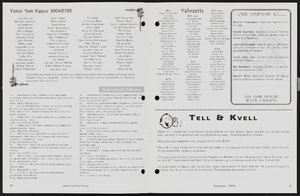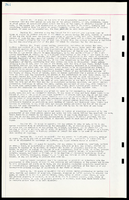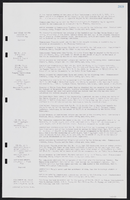Search the Special Collections and Archives Portal
Search Results

Olivia Díaz oral history interview: transcripts
Date
Archival Collection
Description
Oral history interviews with Olivia Díaz conducted by Nathalie Martinez and Barbara Tabach on August 31 and September 14, 2020 for the Latinx Voices of Southern Nevada Oral History Project. In the first interview, Díaz gives her family and personal history, growing up in Las Vegas but often visiting her family in Durango, Mexico for extended stays. She recalls her matriarchal upbringing, particularly while living in Mexico, and what life was like growing up and going to school in East Las Vegas and at the University of Nevada Las Vegas (UNLV). Subjects discussed include: Mexico; Latina identity. In the second interview, Díaz talks about her English language education career for the Clark County School District (CCSD) and the events that led her to run for Nevada Assembly and Las Vegas City Council. She is presently Nevada's Assemblywoman for District 11 and Las Vegas' Councilwoman for Ward 3. Olivia concludes her interview with insights into her political and educational goals for the community and the initiatives she has focused on in light of the COVID-19 pandemic.
Text
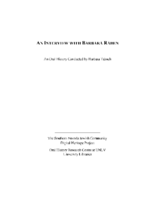
Transcript of interview with Barbara Raben by Barbara Tabach, February 24, 2015
Date
Archival Collection
Description
Interview with Barbara Raben by Barbara Tabach on February 24, 2015. In the first part of the interview Raben discusses her involvement with Hadassah in Southern Nevada, and the various groups within that organization. During the second part of the interview, she talks about her family and her relationship to Judaism, and moving to Las Vegas in 1991. Raben discusses the business she built in Los Angeles and Las Vegas called the Candy Factory. She then talks about the formation of Midbar Kodesh with other families from Temple Beth Sholom. Raben continues to be involved in the Jewish community and the Jewish Family Service Agency.
In 1945, Barbara Raben was born to Kermit and Adele Shulman, children of Eastern European emigrants. She enjoyed a happy childhood in Stamford, Connecticut, and was raised with a strong Jewish identity. After attending college in New Jersey, Barbara married Richard Grisar, and the couple lived in London for a year, before returning to Stamford. In 1975, Barbara and Richard moved to Los Angeles where Barbara owned and operated a very successful candy business, Candy Factory. Sixteen years later, Barbara sold her business, and the family relocated permanently to Las Vegas, where her husband owned radio stations. Barbara has always been an active member of the Jewish community, wherever she lived, giving her time to synagogue, children's day school and service organizations. Upon arriving in Las Vegas, Barbara and her family were members of Temple Beth Sholom, before leaving the congregation to start Midbar Kodesh Temple with a small group of other families. She has been an active member of Hadassah Southern Nevada Chapter for over a decade, helping rebuild the organization locally after participating in the Hadassah Leadership Academy, a program designed to engage a younger generation of members. Currently, Barbara serves as board president and interim executive director for Jewish Family Service. In 2004, then a widow, she married Terry Raben. Barbara has four sons with her first husband: Michael, Andrew, David and Marc Grisar.
Text
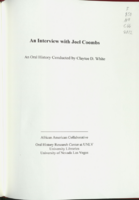
Transcript of interview with Joel Coombs by Claytee D. White, February 22, 2014
Date
Archival Collection
Description
Joel Coombs was raised in an interracial upper middle class family. Born in Newport News, Virginia, his parents relocated and separated when he was young. Joel's white father went on to marry a black woman by the name of Delores. Many of Joel's friends thought that Delores was just hired help, as coming from an interracial home in Las Vegas in the 1970s was considered extremely rare. Joel recalls having to tell his peers on more than one occasion that Delores was his mom and not his maid. His fondest family memories include rock collecting and going to the gun range. Joel became a cheerleader and ran track in high school and college. He recalls attending Valley High School amidst racial tensions, racism, and prejudice. His recollections concerning high school lockdowns and race riots reveal the underlying social issues that once plagued Las Vegas, Nevada. Another major social problem that negatively impacted the lives of Joel's peers was drug abuse, as drugs were easily available at Valley High School and at Bishop Gorman in the 1970s. As an interracial couple Joel's parents were at the forefront of the Civil Rights movement. He recalls participating in the protests as a child and landing on the front page of The Post. In regards to jobs, prior to building and designing roofs and floors at Truss Plant, Joel worked as a jeweler and as a land surveyor. Growing up in an interracial home in Las Vegas helped to shape him into the hardworking, socially aware, and innovative man he is today.
Text
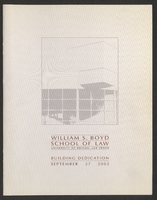
William S. Boyd School of Law building dedication program
Date
Archival Collection
Description
Folder contains program of a building dedication for the William S. Boyd School of Law at the University of Nevada, Las Vegas. From the University of Nevada, Las Vegas William S. Boyd School of Law Records (UA-00048).
Text

Untitled, Martin Luther King holiday: manuscript draft by Roosevelt Fitzgerald
Date
Archival Collection
Description
From the Roosevelt Fitzgerald Professional Papers (MS-01082) -- Unpublished manuscripts file.
Text
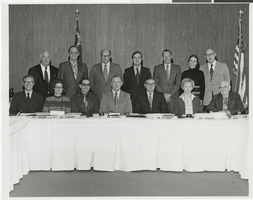
Photograph of Regents, Las Vegas, 1950s - 1960s
Date
Archival Collection
Description
Image
Elizabeth von Till and Claude N. Warren Professional Papers
Identifier
Abstract
The Elizabeth von Till and Claude N. Warren Professional Papers (1916-2021) are comprised of the personal and professional papers of anthropologist Claude N. Warren and historical preservationist Elizabth von Till Warren. The materials in this collection primarily consist of research files, maps, and drawings on various archaeological and historical preservation projects in southern Nevada of which they both were involved. This collection includes field notes and surveys from archaeological projects such as the Old Las Vegas Mormon Fort and the Las Vegas Springs Preserve. Records on von Till Warren's involvement with the Old Spanish Trail Association, Southern Nevada Historical Society, and historic preservation work around southern Nevada are represented. Also included are Robert H. Crabtree's archaeological research files, a colleague of Claude Warren who bequeathed his professional files to him upon his death.
Archival Collection

